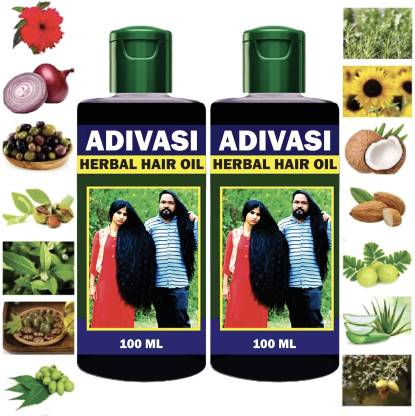Natural and organic products are rapidly gaining popularity, the beauty industry has seen a significant shift towards natural hair care. Among these, hair oils have become a cornerstone of many hair care routines. However, with the surge in demand for natural products, the market has also become flooded with products that claim to be pure and authentic but fall short of those promises.
The Importance of Pure and Authentic Natural Hair Oils
Natural hair oils play a crucial role in maintaining healthy hair and scalp. They offer numerous benefits such as moisturizing, nourishing, strengthening, and promoting hair growth. Unlike synthetic products, natural oils are free from harmful chemicals, making them a safer and more effective choice for long-term hair care.
Adivasi herbal hair oil, a traditional concoction used by tribal communities in India, is a prime example of a natural product that has stood the test of time. Its blend of various herbs and oils provides a holistic approach to hair care, emphasizing the importance of purity and authenticity.
Key Indicators of Pure and Authentic Natural Hair Oils
- Ingredient Transparency
- The label should clearly list all the ingredients used in the oil.
- Look for oils with minimal ingredients, predominantly natural and organic.
- Avoid oils with long lists of synthetic additives, preservatives, or artificial fragrances.
- Natural Fragrance
- Pure oils will have a natural, earthy aroma, often derived from the herbs and plants used.
- Strong, artificial fragrances are a red flag, indicating the presence of synthetic chemicals.
- Texture and Color
- Natural oils typically have a light texture and are easily absorbed by the scalp and hair.
- The color should appear natural, varying depending on the ingredients used. For instance, coconut oil may be clear or slightly yellow, while castor oil is usually pale yellow.
- Packaging
- Authentic natural hair oils are often packaged in dark glass bottles to protect them from light and heat, which can degrade the oil.
- Avoid products in clear or plastic bottles that do not offer adequate protection.
- Certifications and Labels
- Look for certifications from reputable organizations that verify the authenticity of organic and natural products.
- Labels such as USDA Organic, ECOCERT, or similar regional certifications can provide assurance of the product’s purity.
- Company Reputation
- Research the brand’s history and reputation in the market.
- Brands like those selling adivasi herbal hair oil often have a legacy of traditional knowledge and practices that emphasize authenticity.
- User Reviews and Testimonials
- Genuine reviews from users can offer insights into the product’s effectiveness and authenticity.
- Positive feedback about noticeable benefits and the absence of side effects is a good indicator of a high-quality product.
Common Types of Natural Hair Oils and Their Benefits
- Coconut Oil
- Rich in lauric acid, it penetrates deep into the hair shaft, providing intense hydration.
- Known for its antibacterial and antifungal properties, it helps maintain a healthy scalp.
- Argan Oil
- Often referred to as liquid gold, it is packed with antioxidants, vitamins, and essential fatty acids.
- It helps to tame frizz, add shine, and protect against heat damage.
- Adivasi Herbal Hair Oil
- A blend of traditional herbs and oils, this concoction is known for promoting hair growth, preventing hair fall, and nourishing the scalp.
- Ingredients like bhringraj, neem, and amla are commonly used, each contributing unique benefits.
- Castor Oil
- High in ricinoleic acid, it enhances circulation to the scalp, promoting hair growth.
- It also has moisturizing properties that can help with dry and flaky scalp conditions.
- Jojoba Oil
- Closely mimics the natural sebum produced by the scalp, making it an excellent moisturizer.
- It helps in maintaining the scalp’s natural balance and prevents dandruff.
How to Use Natural Hair Oils Effectively?
- Pre-Shampoo Treatment
- Apply the oil to the scalp and hair before washing to protect against harsh shampoo ingredients.
- This can help retain moisture and reduce the drying effects of shampoo.
- Overnight Treatment
- For deep conditioning, apply the oil generously and leave it overnight.
- Cover with a shower cap or towel to prevent staining your bed linens.
- Scalp Massage
- Regular scalp massages with natural oils can improve blood circulation, stimulate hair growth, and relax the mind.
- Use circular motions to ensure the oil penetrates deep into the scalp.
- Hair Mask
- Combine natural hair oils with other ingredients like honey, yogurt, or aloe vera to create nourishing hair masks.
- Leave the mask on for 30 minutes to an hour for best results.
Avoiding Common Pitfalls
- Avoid Overuse
- Over-application can lead to greasy hair and scalp buildup. Use sparingly and according to your hair type and needs.
- Patch Test
- Before using a new oil, perform a patch test to rule out any allergic reactions.
- Apply a small amount to a discreet area of the skin and wait 24 hours.
- Proper Storage
- Store oils in a cool, dark place to prevent oxidation and preserve their quality.
- Always close the bottle tightly after use to prevent exposure to air.
Conclusion
Identifying pure and authentic natural hair oils is crucial for maximizing the benefits of your hair care routine. By understanding the key indicators of quality and knowing how to use these oils effectively, you can achieve healthier, more vibrant hair. Embrace products like adivasi herbal hair oil, which carry the wisdom of traditional practices, offering a holistic approach to hair health. Whether you are an industry professional or a hair care enthusiast, these insights will help you make informed decisions, ensuring that your hair receives the best care possible.


